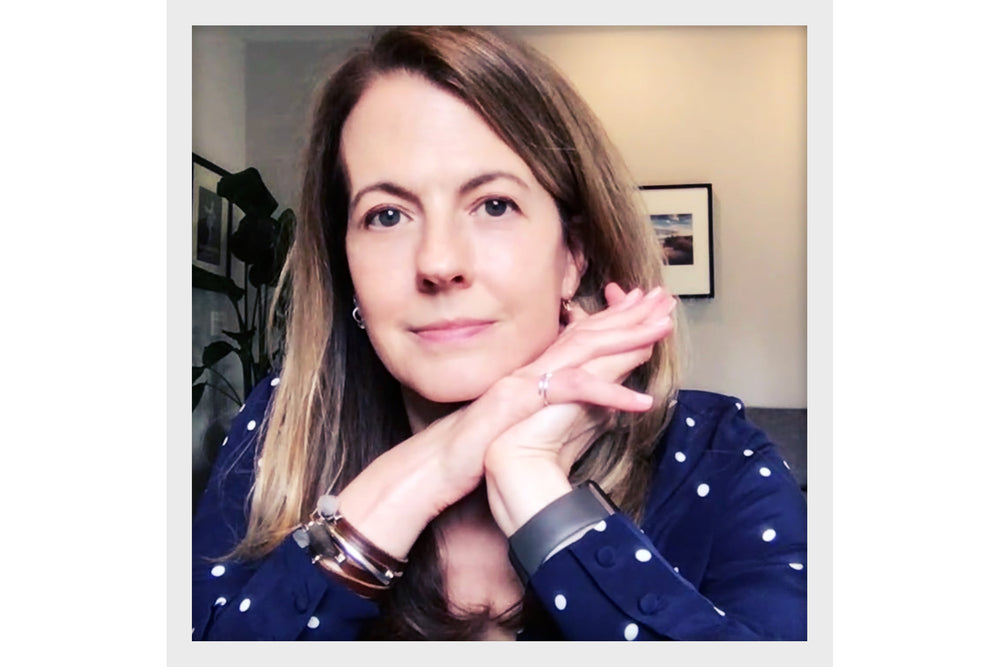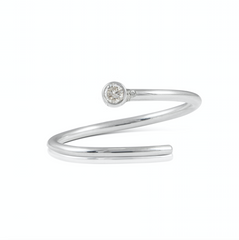Sharon Hoffman: The New 'Jimmy Kimmel Live' Executive Producer on Career, Mentors, and Zoom
Posted by Shiffon Co. on

This feature is part of our series on members of our community who inspire us. From entrepreneurs, stylists, and consultants starting their own businesses to executives changing the game at the highest levels, we’re lucky to be able to learn from these incredible role models.
In that vein, half the profits from our Duet Pinky Rings fund seed grants for entrepreneurs around the world. Each ring is a symbol of a pinky pledge to pay it forward to support women & a connection between each member of our community. Make your own pinky pledge here.
This interview has been edited and condensed for clarity.
by Shreya Chaganti
Photographed by Shoji Van Kuzumi
Emmy-winning producer Sharon Hoffman is no stranger to chaos. Recently named the new executive producer of a little show you might have heard of called Jimmy Kimmel Live!, she is an industry veteran with deep experience in daily news production. With stints at Entertainment Tonight, CBS News, and Good Morning America, she knows how to work a busy control room, but has had to adapt quickly to a different kind of chaos — starting a dream job and managing a full staff in the midst of COVID-19. We got a chance to speak to her about what exactly an executive producer does, what it’s been like beginning her new job remotely, and her mentors.

How did you get started in producing?
My first job actually was a long time ago as an editorial assistant for Entertainment Weekly magazine. I was writing little stories back then — which was a big deal for an assistant — and I got to write about Jeff Zucker, who at the time was head of the Today Show, but is now the head of CNN.
I spent a morning with him in the control room at the Today Show, and I was so utterly awed. I just knew — this is what I want to do. And so I figured out how to make it happen. I knocked on many doors until somebody opened one, and then I started working for NBC.
How strange is it to start a new, high profile job over Zoom?
It is definitely an unusual way to start a new job. Ordinarily I would be planning a lot of in person meetings, and I’m also in another time zone. I don't think anyone would have chosen to be working this way to start a new job as a leader, because creating those connections is really important.
On the other hand, there's kind of a funny intimacy to Zooming in people's homes. It’s taken a wall down because people are a little less nervous. The nice thing too is that everyone’s name is on their screen, and for a new boss of a 200-odd person staff, that is a godsend. I can learn people’s names really quickly. I'm trying to focus on the positive aspects of it!
For people not in this field, there’s a lack of understanding of what a producer does. What does your role as Executive Producer at Jimmy Kimmel Live entail?
There are actually two executive producers on this show: Jimmy Kimmel, and me. My role is the most senior production role on the show, and I have oversight responsibilities for the staff and ultimately have responsibility for what we air.
Day-to-day, the work focuses on making sure everything’s being done right, on time and within the budget. Then, how do we follow up to make sure every day that the show is the best it can be. Are we being creative enough? Are we using social media effectively? Is the audience growing? Is the staff getting regular feedback on how they’re doing and guidance to help them grow and get where they want to go professionally? Every day is some combination of all of those things. There are a lot of moving parts. But it’s also really fun.
Did you know what you were getting into when you were just starting out?
The complexity of it is part of what dazzled me. The first time you step into a big control room and you see as many as 50 feeds up on the screen with all of the noise and chaos of a live control room, it feels a little bit like stepping into the cockpit of a plane. There are all these boards and lights, and you think how could anyone possibly understand how to do that? Thankfully, I've worked with great professionals, so I don't have to know how to work all of them. But there is a lot of specific expertise in that room.
And I just thought it was really exciting. Some people go into a room like that and it makes them nervous because there's so much going on and it's not a peaceful place. It's not for everyone, but if you're cut out for it, it's a shot of adrenaline.
What’s been different about running a late night show compared to your previous work, which was primarily in news?
I’d always worked in news before I got to ET, which was more entertainment news, and now I’m working in late night. What always appealed to me about working in news was informing people about the world around them. I thought that that was a noble thing to do for a living and I really believe in that; it's incredibly important to have a robust information system and strong journalism in a democracy.
Evolving into a different world is not only an exciting growth opportunity for me personally and professionally; it's just also reflective of the fact that the dialogue is widening beyond broadcast news shows and the newspapers that used to land on your front doorstep in the morning.
Late night shows are so topical, and to stay relevant they need to really be cognizant of what’s going on truly right now, like today.
Jimmy Kimmel — he’s been on the air almost 20 years. I’ve admired him as a viewer for a while, and I think that he’s got the perfect tone right now. He’s really authentic, he’s an incredible human being. The guy you see on TV is the guy he really is. And it's important to me to work with somebody like that, who is trying to help guide the conversation, nationally, to topics that have importance. Shows like this are the ultimate team sport; they’re really, really big and there are so many moving parts. You definitely need to have a shared passion and sense of purpose in order for it to work and work well.
Have there been any mentors along the way that made a big impact on you?
One in particular that jumps out is Susan Zirinsky, who is now the president of CBS News. She was a longtime CBS producer, and she was sort of a legend in the business. There's a movie that I suspect is before your time called Broadcast News, and it was a Holly Hunter movie in the late 80s, early 90s. Holly Hunter played a TV news producer, Albert Brooks was in it, William Hurt played the anchor that she worked with, and it was all about the behind the scenes of what it's like to work in a broadcast news network.
I remember watching that and just wanting to be her. And I say her, because the Holly Hunter character was specifically based on Susan Zirinsky, and everybody knew that at the time. So when years later I found myself at CBS News actually having the real live Susan Zirinsky as a mentor, teaching me how to be a great producer and a great leader — that was mind blowing. It was a “leave the room and pinch yourself” kind of a moment. She has taught me a lot about how to be great, because she's one of the greats. And it's why she has the job she has now. She's an amazing woman and we're friends now.
Favorite book?
Impossible to pick one. Recently I really enjoyed “Uncanny Valley,” which is a memoir Anna Weiner wrote about pivoting from publishing to Silicon Valley.
Favorite movie?
The one I have probably watched the most is “The Color Purple.” Makes me cry every time.
Favorite piece of jewelry?
My pinkie ring of course! Also, I have a pretty sizable bracelet collection that I add to whenever I travel.
Something that would surprise people about you?
That I was a Chinese History major.
Stay tuned this fall for a relaunch of the Shift, with more stories about Sharon and other inspiring women like her.
Visit startupgirlfoundation.org to learn more about the companies our Duet Pinky Ring is currently funding. Make your own pinky pledge to pay it forward and support women by purchasing a Duet Pinky Ring here.


